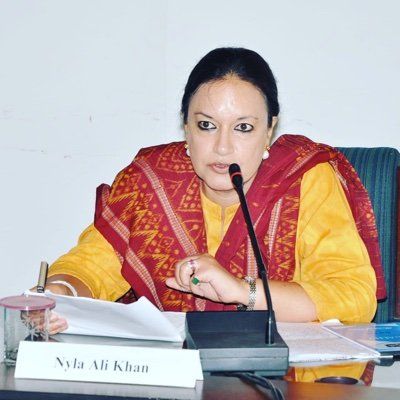Sheikh Abdullah would have asked for self- determination in 1989, if alive: Nyla
Nyla Ali Khan, granddaughter of former Jammu and Kashmir prime minister Sheikh Muhammad Abdullah, has claimed that his grandfather, if alive in 1989 when militancy broke out in the Valley, would have sought self-determination for people.
-by Peerzada Ashi q
Nyla Ali Khan, granddaughter of former Jammu and Kashmir prime minister Sheikh Muhammad Abdullah, has claimed that his grandfather, if alive in 1989 when militancy broke out in the Valley, would have sought self-determination for people.
“Despite tremendous changes in the world order, Sheikh Mohammad Abdullah did not lose faith in the international system which was premised on the Woodrow Wilson’s principle of self-determination, post-World War 1.
“The Sheikh, I argue, sought self-determination for Jammu and Kashmir as a territorial unit, not as a Muslim nation,” said Khan, a visiting professor at University of Oklahoma and assistant professor at University of Nebraska in Kearney in the US.
Author of many books, including the recently released biography on her grandmother titled ‘The Life of a Kashmiri Woman: Dialectic of Resistance and Accommodation’, Khan claimed her grandfather, also founder of National Conference and grandfather of Omar Abdullah, saw Kashmir as part of the international polity.
“He perceived the evolution of Kashmiri nationalism in world-historical terms, as opposed to a domestic and local issue. That’s exactly what his politics would have been post-1989,” she said.
On vacations in Kashmir, Khan believes that for restoration of political stability and peace in J&K, it requires a strong and prosperous India. “That is good for the restoration of our political autonomy, but we also need a strong and prosperous Pakistan. That would be even better for the restoration of political autonomy in our part of the world,” she added.
She claimed Kashmiris are both disillusioned with India and Pakistan. “The identity and nationalism of the people of J&K need to be recognised to build the political and ideological bridges across the provinces of our own state by talking to the people of all the regions,” she stressed.
Backing the four-point formula of former Pakistan president Pervez Musharraf , Khan said, “The formula, which was about the restoration of autonomy in phases, demilitarisation, phased withdrawal of Indian and Pakistan armies, enabling travel across LoC, enabling economic exchanges and business transactions across LoC, making people to people contacts easier was a good beginning.”
“I don’t see Musharraf’s formula as an end in itself, but it would have helped in slowly building confidence in J&K and in Pakistan. Then we could have gone forward to discuss the right of self-determination,” she added.
On relevance of UN resolution on Jammu and Kashmir, Khan thinks they have not lost their relevance. “In 1948, the UN talked about plebiscite in Kashmir, but soon after it went into deep slumber… then we had the Shimla Accord which made the Kashmir issue a bilateral one and kind of marginalised the role of the UN. But I don’t think we should begin with those (UN Resolutions). I don’t think we should say it is either UN resolutions or nothing at all, because we realise that we have suffered tremendously particularly since 1989,” she said.
“Our younger generation has suffered tremendously, not only politically and economically but psychologically as well and the effects are for all to be,” she said.
Khan, who gave a lecture at Kehwa Talk, a social group of youngsters reclaiming social space, said Kashmir is a conflict zone. “There is no doubt about that. I don’t want the decimation and destruction of another generation of Kashmir. So the kind of approach that we need to have now should be constructive and positive. That enables us to develop as a society,” she said.
Dr. Nyla Ali Khan



